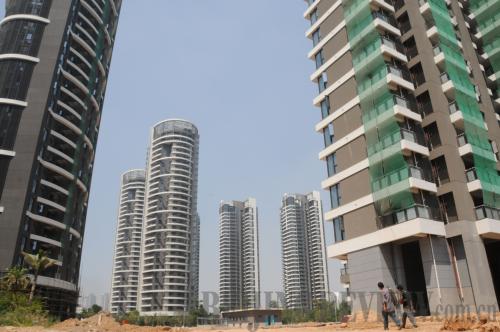|
 |
|
STRINGENT OVERSIGHT: A commercial residence complex built with foreign investment has been finished in Xiamen, southeast coastal Fujian Province. China aims to keep a tight control over foreign capital inflows into the domestic property market (LAI JIANQIANG) |
On January 5, a consortium composed of Hong Kong-listed Kerry Properties Ltd., Shangri-La Asia Ltd. and Singapore-listed Wilmar International Ltd. announced their success in winning bids for land parcels worth 1.36 billion yuan ($206 million) in Yingkou, northeast China's Liaoning Province. The three companies plan to set up one or more joint ventures to develop the project site with a total investment of up to 7.5 billion yuan ($1.14 billion).
This conglomerate was not alone in its march into China's housing market. GTC, the biggest real estate enterprise in central and eastern Europe, recently announced that one of its comprehensive commercial complexes was completed in Chengdu, capital of southwest China's Sichuan Province. As for the Chinese market, the foreign company is preparing to invest as much as 5 billion euros ($6.8 billion) in the following several years.
Against the backdrop of the global financial crisis, the Chinese market faces much smaller risks than other countries, said GTC Chairman Alon Shlank.
Last year, housing prices in 70 large and medium-sized cities experienced year-on-year growth of more than 10 percent between February and July. Although it started to slow in May due to tough government measures, prices in December still grew 6.4 percent year on year and 0.3 percent month on month, according to the National Bureau of Statistics.
Facing China's sizzling housing market, foreign funds cannot afford to stand on the sidelines. According to the Ministry of Commerce (MOFCOM), 972 foreign-funded real estate companies completed registration from January to November last year, a year-on-year increase of 18.7 percent. The number reached 1,100 for the whole of 2010.
The property sector absorbed $20.1 billion in foreign direct investment (FDI) from January to November 2010, jumping 48 percent year on year, compared to a 17.73-percent growth in the total FDI in the same period, according to MOFCOM data.
Since the end of 2009, foreign investments have been roaring back to China's real estate markets, said a report by DTZ, a global leading real estate advisor. Those capital inflows have watered down China's efforts to cool the property fever, it said.
Caught in the predicament of housing market regulation, the Chinese Government has to guard against foreign capital inflows that might complicate China's policy to fight housing speculation.
Profit in China
Foreign property investment was lackluster in 2009, but changes occurred throughout 2010, said Liu Deyang, China Executive Director Chairman of the London-listed Savills, a leading global real estate service provider.
"In the post-crisis era, financing became much more difficult for foreign-funded institutions. In the United States, many investment banks stopped lending. Because of this, foreign investors are looking for investment destinations with low risks and high returns," said Liu.
China was their best choice owing to its rapid economic growth, which outshines European countries, caught in the midst of a debt crisis, and the United States, with its high unemployment rate, said Liu.
Yang Hongxu, a researcher with the Shanghai-based E-house China Research and Development Institute, attributed the foreign investment surge in properties to expectations that the yuan will appreciate.
Even if the housing prices stay stable, the foreign-funded property companies could make a profit as a result of the yuan appreciation, not to mention that China's housing prices have surged in recent years, said Yang.
| 